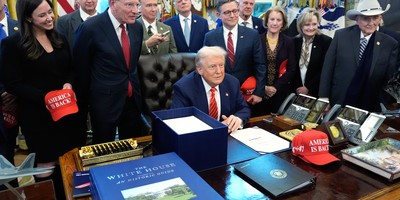In June 2020, the World Economic Forum — working alongside officials from large corporations, banks, financial institutions and activist groups — launched a far-reaching initiative that aims to push the “reset” button on the global economy. They ominously called it the “Great Reset,” and since its creation, it has received a massive amount of support from leaders of the ruling class, both here in the United States and around the world.
The Great Reset has two primary components. The first is an expansion of government programs, taxes and regulations, which together affect virtually every industry in the world, from oil and gas to health care and technology.
The second, arguably much more important part of the Reset is the complete alteration of the way most of the world’s largest businesses are evaluated.
In a free-market economy, or even one that heavily relies on markets, businesses are subject to supply and consumer demand. The companies with the best goods and services rise to the top and expand. Poorly run companies eventually contract or even close altogether, freeing up capital and investment for new companies.
Of course, anyone who has been paying attention to public policy and economic developments over the past 50 years knows that a truly free-market system does not exist in America, or most other places. Cronyism, corruption and government manipulation are rampant throughout the U.S. economy, routinely distorting markets and allowing some to unfairly get rich at the expense of others.
Rather than try to improve markets by ridding them of corruption, Great Reset supporters want to double down on cronyism by giving the ruling class — including central banks, academics, government officials, union leaders and corporate titans — greater control over markets.
The way they plan to do this is through something called environmental, social and governance (ESG) standards, which are also sometimes referred to as “sustainable investment,” “inclusive capitalism” or “stakeholder capitalism.”
Recommended
Under an ESG system, corporations are given scores based on dozens of metrics that go far beyond the quality of a company’s goods and services, its profits and other factors investors and consumers normally consider. With ESG measures in place, businesses are evaluated based on the racial and gender composition of their staff, their carbon footprint, the size of their buildings, how committed they are to fighting climate change and a bunch of other social justice concerns.
After being evaluated, companies are then given (or they self-report) ESG scores that are meant to help investors, regulators and governments have a better understanding of who the “bad” and “good” companies are.
You might be surprised to learn that over the past several years, thousands of companies around the world, including many of the most famous American corporations, have voluntarily adopted ESG scores. One study indicates about 82 percent of all large businesses in the United States already have ESG scores in place.
There are many reasons why businesses have been willing to build substantial ESG systems within their own companies, but the two biggest are money and fear of future government action. Tens of trillions of dollars have already been committed or allocated toward funding ESG businesses and other forms of “sustainable investment,” and investors and financial institutions have repeatedly said in recent months that they will phase out their business relationships with those who don’t support some or all ESG goals.
ESG systems are incredibly worrisome, because those with the power to alter them have the ability to control, or at least significantly influence, society.
When this concern has been brought up in the past, supporters of the Great Reset have said that there is nothing to worry about, because ESG systems are not mandated. Companies and banks are freely choosing to adopt them.
However, the truth is, companies have not embraced ESG systems because they support ESG causes, but rather because they have been coerced to do so, and, even more importantly, because they have known for at least the past year that ESG government mandates were just around the corner. Recent developments in Europe prove these fears were not unfounded.
In March, the Parliament of the European Union passed a resolution that seeks to require nearly all of the EU’s largest companies — and many smaller businesses, too — to adopt and prioritize ESG metrics. And especially important for U.S. businesses and consumers, the resolution would further require that EU companies only work with those who share the European Union’s environmental, social and governance standards.
As the Shearman and Sterling law firm noted in a report about the resolution, “If adopted, all EU Member States will be required to implement the Directive into their national laws. This will result in substantive due diligence requirements being imposed on companies, whether based in the EU or selling their products and services into the EU, across their entire value chain, with potential sanctions for non-compliance.”
It is vital to take note of the term “value chain.” In the resolution, it is defined as “all activities, operations, business relationships and investment chains of an undertaking and includes entities with which the undertaking has a direct or indirect business relationship, upstream and downstream, and which either: (a) supply products, parts of products or services that contribute to the undertaking’s own products or services, or (b) receive products or services from the undertaking.”
This provision would apply to virtually every U.S. business that works in the European Union or has a business relationship with an EU company, giving substantial influence over American society to EU officials.
Although the EU resolution has already been approved in the European Union’s Parliament, it is not yet binding. It first must be formally introduced by the European Commission and the final version approved by representatives of the EU’s member states. However, the support for the resolution in the EU Parliament is a strong indicator that ESG systems could soon become mandated throughout Europe.
This move is straight out of the Great Reset playbook, and, if completely put into place, has the potential to fundamentally transform the world — a stated goal of the highest-profile members of the Reset movement.
This is an important and potentially catastrophic moment for the pro-liberty movement. If Americans and their elected representatives do not push back against the European Union soon, as well as stop efforts to impose ESG systems within America, there will be no way to prevent the Great Reset from becoming a reality.
Justin Haskins(Jhaskins@heartland.org)is the editorial director of The Heartland Institute and the director of Heartland’s Stopping Socialism Project.

























Join the conversation as a VIP Member